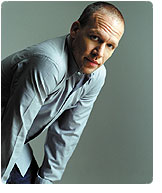|
|
 |
 Ladino Jazz and Clave Cantatas: Bassist Avishai Cohen Sings Roots into Gold
Ladino Jazz and Clave Cantatas: Bassist Avishai Cohen Sings Roots into Gold
Israeli bassist Avishai Cohen is an alchemist at heart. Finding inspiration in musicians ranging from Bach to Stevie Wonder, Avishai can transform a tired Israeli school tune back into poetic gold. He can take the Sephardic melodies his grandfather sang in prayer, or his mother hummed while washing dishes, and make them groove. He can take a sinuous and spontaneous jazz bass line turn it into a top forty hit.
Avishai’s joyful powers of transformation are in full force as he embarks on his North American Tour (Lewiston, MA; New York, NY; Oakland, CA; Los Angeles, CA; San Diego, CA and Portland, OR) starting October, 2010 and on Aurora (EMI), an album turning roots into lyrical, intense songs that showcase not only Avishai’s masterful bass and lifelong musical loves, but his newfound voice.
“It’s a very good practice for any musician, to learn to sing. It’s a beautiful practice in humility, an ongoing craft,” Avishai explains, musing on why he took up singing after decades as a successful jazz bassist. “But you have to take care. You have to like yourself enough to listen to yourself. To accept things that don’t always come out just how you imagined them. It is very exposed.”
Though Avishai’s first performance as a vocalist came at an American summer camp, where a boogie-woogie loving music director got the kids singing songs from Free to Be You and Me, he dropped the idea of combining his chosen instrument and his voice for decades. Years later, at a New York club, Avishai was blown away by Andy Gonzalez “an unsung hero of Latin bass, who effortlessly sang along while brilliantly powering the rhythm section. “I asked him how he managed it,” Avishai recalls. “He just looked at me and said in his characteristically New York tough way, ‘Yeah, it took me a minute or two.’”
Not one to turn away from a challenge, Avishai began singing himself, led by the sound of the bowed upright bass. The bow, producing the sustained notes crucial to perfect bass technique, showed Avishai how to use his voice expressively. “My two main influences as a singer are my mother and the bow,” he smiles.
Avishai’s mother would sing Ladino songs, the Spanish-based language of the Sephardic Jewish tradition, as she went about her day. The sound of her effortless, utterly-sincere voice—along with the influence of his father and grandfather singing in the Sabbath and the classical training he received on piano—stuck with him.
It sparked his exploration of songs like “Noches Noches” and “Morenika,” whose haunting melodies seeped into Avishai’s consciousness from childhood. Harnessing the power of these melodies, Avishai’s arrangements are guided by some unexpected sources: the counterpunctual brilliance of J.S. Bach.
“When I was really young, Bach’s music fascinated me. He sustains two melodies at the same time, and one supports the other: Without one, the other can’t exist,” Avishai notes. “It’s like a fifth dimension that comes into play when I’m listening to and creating music.” Music like his delicate piano-accompanied rethinking of a classic Israeli song learned by most schoolchildren, “El Hatzipor,” about a bird telling a distant listener about the beauty of Israel.
Along with the vibrant Sephardic and Baroque sounds of his childhood, Avishai’s sojourn in New York as a young man made an indelible stamp on his music, where he went from working construction to playing with jazz great Chick Corea and as many Latin ensembles as he could manage. He loves drawing on Latin grooves and tucking them into his arrangements.
“I incorporate the feel of the clave a lot into my compositions. Whoever invented it was a genius,” Avishai exclaims. “It’s a common language that, in two bars of music, unites Africa, Cuba, and New York, where I heard some of the best players perform. That influenced my writing big time; I’m a rhythmic thinker, yet very melodic.”
Much of the musical thinking behind Aurora sprang from simple melodies Avishai improvised on his bass during key moments in his life, personal turning points that resonated emotionally. Songs like “Alon Basela,” an homage to the fortitude of men like his father, whom he compares to the striking alon tree whose strength and resilience is demonstrated by growing straight out of the rock. Or “Shir Preda” which earned Avishai an unheard of hit on Israeli pop radio, “something that never happens to jazz guys,” he laughs. “When I write with the bass, the songs are more grounded.”
This powerful grounding, in both Avishai’s instrument and his voice, transcends language. Though Avishai sings in Hebrew and Ladino, he has few qualms about being misunderstood. Thinking back to his first revelatory experience listening to his sister’s Beatles albums, Avishai recalls the joys of imagining his own stories to match the compelling songs he fell in love with. "I could make up my own images because I didn't understand the lyrics, or only half understood,” Avishai reflects. “The honesty of that music was stronger than any language, and that’s what I long to transmit with my own music."
Shifting between languages and genres, as oud vibrates alongside piano chords, Avishai speaks with a voice that is both global and extremely local, universally resonant and yet deeply personal. All thanks to an unexpected turn to song: “The voice is always fresh because it’s such a human, ever-evolving instrument,” Avishai reflects. “You can never know what to expect and you can never master it, even if you try to gain as much control as you can. It’s a healthy but paradoxical thing, like the heart.”
www.avishaimusic.com
<< release: 04/27/10 >>
|
|
 |
|
|
|